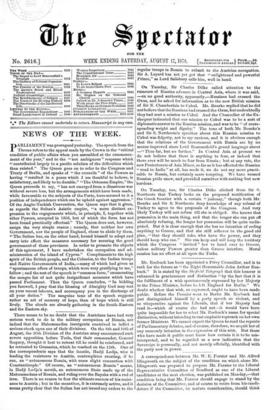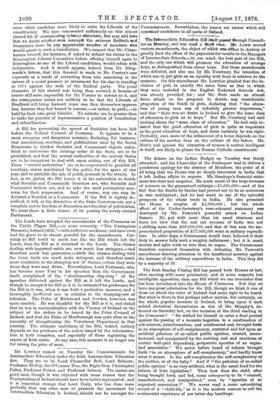A correspondence between Mr. W. E. Forster and Mr. Alfred
Iffingworth on the subject of the condition on which alone Mr. Blingworth was prepared to propose Mr. Forster to the Liberal Representative Committee of Bradford as one of the Liberal candidates at the next election, was published on Monday,—that condition being that Mr. Forster should engage to stand by the decision of the Committee, and of course to retire from his candi- dature if the Committee, on mature consideration, should think some other candidate more likely to unite the Liberals of the constituency. We have commented sufficiently on this almost absurd bit of electioneering tyrstany erlsewhirke, but may add here that we doubt whether evrin aniongat the extreme Radicals eind Democrats there be any appreciable number of ['members *he would assent to such a humiliation. We suspect that Mr. Cham- berlain himself, for instance, if asked to submit his claims to the Birmingham Liberal Committee before offering himself again to Birmingham as one of the Liberal candidates, would refuse with indignation. And it would appear, indeed, from Mr. Illing- worth's letters, that this demand is made in Mr. Forster's case expressly as a mode of extracting from him something in the nature of a moral penance or atonement for his sins in standing in 1874 against the wish of the Radical party. The penal character of this absurd rule being thus avowed, it became of course still more impossible for Mr. Forster to submit to it, and the consequence seems not unlikely to be that the Liberals of Bradford will bring forward some one they themselves approve less, because they feel bound in hononr,—or rather, in pride,—to hold by their own great blunder. No mistake can be greater than to make the position of representative a position of humiliation and subordination.































